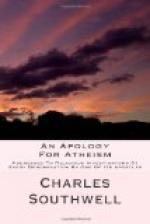Nor is it found that non-established priesthoods are much more disposed to emancipate ‘mind’ and oil the wheels of political progression than those kept in state pay. The air of conventicles is not of the freest or most bracing description. No doubt the ‘voluntary principle’ is just—only brazen faced impostors will say it is right to tax a man for the support of those who promulgate doctrines abhorrent to his feelings and an insult to his judgment. Still, the fact is incontestable, that Dissenting Priests are, for the most part, opposed to the extension of political rights, or, what is equal, that’ knowledge which would infallibly secure them. The Methodist preacher, who has the foolish effrontery to tell his congregation ’the flesh lusteth always contrary to the spirit; and, therefore, every person born into the world deserveth God’s wrath and damnation,’ may be a liberal politician, one well fitted to pilot his flock into the haven of true republicanism: but the author is extremely suspicious of such persons, and would not on any account place his liberty in their keeping. He has little faith in political fanaticism, especially when in alliance with the frightful doctrines enunciated from conventicle pulpits, and has no hesitation in saying that Anti-State Church Associations do not touch the root of all political evils. Their usefulness is great, because they give currency to a sound principle, but that principle, though important, is not all-important—though powerful, is not all-powerful. If universally adopted, it is questionable that any useful change of a lasting character would be worked in the economy of politics.
Priests of all religion are the same, said Dryden—the religions they teach are false, and in their tendency anti-progressive, say Atheists, who put no trust in doctrine which involves or assumes supernatural existence. Believing that supernaturalism reduced to ‘system’ cannot be other than ‘wickedly political,’ the Atheist, truly so called, sees no hope for ‘slave classes,’ apart from a general diffusion of anti-religious ideas. According to his theory, religion is in part a cunningly and in part a stupidly devised fable. He cannot reconcile the wisdom of theologians with undoubted facts, and though willing to admit that some ‘modes of faith’ are less absurd than others, is convinced they are all essentially alike, because all fundamentally erroneous. Rousseau said ’philosophy can do nothing that religion cannot do better, and religion can do many things which philosophy cannot do at all.’ But Atheists believe religion the most formidable evil with which progressors have to cope, and see in philosophy that mighty agent in the work of improvement so beautifully described by Curran as the irresistible genius of universal emancipation.




